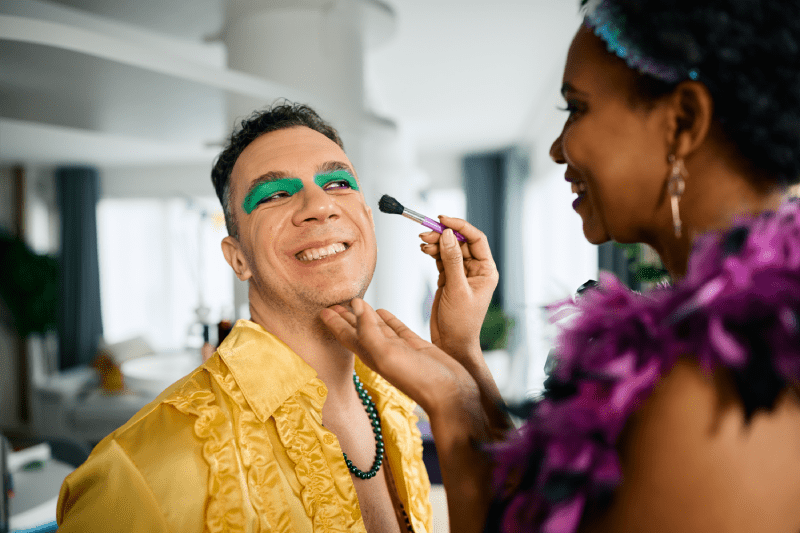Male-to-Female Gender Reassignment Surgery (MTF GRS) is the most critical stage of a person’s journey to having a body aligned with their identity. Among the most frequently wondered and worried topics in this process are whether the surgery is painful, the quality of functional outcomes, and how the recovery process will be managed. Turkey, with its specialized surgeons and all-inclusive packages, offers the opportunity to carry out this significant decision safely and comfortably. This guide explains all the details you need to know about Vaginoplasty, based on scientific data and in a transparent language.
What is Gender Reassignment Surgery (Vaginoplasty)?
Vaginoplasty is a surgical procedure that creates a vagina, labia, and clitoris structure using penile and scrotal tissues, focusing on aesthetic and functional outcomes. The main goal of this surgery is to ensure alignment between the biological gender and identity, not only by achieving an aesthetic appearance but also by preserving sexual sensitivity and providing adequate depth. The most common method is the “Penile Inversion” technique, which is based on turning the penile skin inside out. This technique is critically important for the continuation of sexual sensation because it preserves the existing nerve endings. The surgery typically lasts between 4 and 6 hours and is performed by experienced surgeons.
Is the Surgery Process Painful? How is Pain Managed?
Despite MTF GRS being a comprehensive surgical procedure, severe pain is prevented thanks to modern anesthesia and post-operative pain management techniques. The patient feels nothing during the surgery as they are under general anesthesia. In the post-operative period, intravenous pain pumps (PCA – Patient-Controlled Analgesia) are used throughout your hospital stay. Pain is usually described as a feeling of “intense pressure and tightness” rather than “sharp pain.” This discomfort can be easily managed with prescription oral pain relievers provided after discharge from the hospital. Successful pain management allows the patient to mobilize early and focus on the recovery process.

What Are the Eligibility Criteria for MTF GRS?
International standards have set strict eligibility criteria for MTF GRS. The candidate is expected to be over 18 years old, have the diagnosis of gender dysphoria confirmed by a mental health professional, and have received at least 12 continuous months of Hormone Replacement Therapy (HRT) before the surgery. Furthermore, the patient must have realistic post-operative expectations, demonstrate commitment to long-term care such as the dilation protocol, and be in a general health condition that can withstand the surgery. Since smoking severely impairs wound healing, candidates are required to quit smoking before the surgery.
How is the Success of the Surgery Evaluated?
The success of Vaginoplasty is evaluated not only by aesthetic results but also by functional outcomes. A successful result is measured by the sustainable vaginal depth (with the dilation protocol), the neovagina looking aesthetically natural, the urinary tract working properly, and most importantly, the preservation of clitoral sensation. The increase in the patient’s post-operative quality of life and psychological well-being, meaning the resolution of gender dysphoria, is the most important indicator of final success. The surgeon’s experience and the patient’s adherence to recovery instructions directly influence the success rate.
30 Frequently Asked Questions (FAQ) About the Treatment
How is Sexual Function Affected After Surgery?
Vaginoplasty involves preserving the nerve connections of the clitoris and placing it in a new location. Thanks to this, the vast majority of patients retain clitoral sensation and the ability to orgasm after surgery. Full sensation recovery may take a few months due to nerve healing. The use of the new vagina for sexual intercourse depends on the surgical technique and the degree of adherence to the dilation protocol. A successful surgery opens the door to a satisfying sexual life.
How is the Vaginoplasty Technique (Penile Inversion) Applied?
Penile Inversion is the most common and reliable vaginoplasty technique. In this method, the penile skin is inverted to form the lining of the vaginal canal and is placed into the surgically created space in the pelvic cavity. A portion of the scrotal skin is also used to create the labia majora structure. The clitoris is created from the sensitive tissue of the glans penis and placed in an anatomically correct position. This technique provides the best results in terms of natural color, texture, and nerve distribution by utilizing existing tissue.
How is Clitoral Construction (Clitoroplasty) Performed?
Clitoroplasty is a sensitive and critical stage of Vaginoplasty. The surgeon positions the most nerve-rich part of the glans penis at the top of the new vagina, where the clitoris should anatomically be located. The aim is to preserve sufficient sensitivity for sexual arousal and create an aesthetically natural clitoral appearance. The surgeon’s experience in this stage is a determinant factor for post-operative sensation.
How is Vaginal Depth Ensured and Maintained?
Vaginal depth depends on the length of the skin graft placed into the created cavity and the technique applied by the surgeon. The key to maintaining this depth after surgery is dilation. Patients must perform dilation (stretching) at the frequency and duration specified by the surgeon. Dilation prevents tissue contraction (stenosis) and ensures the vagina remains at an adequate length and width. Dilation is a lifelong maintenance process, intensified in the first year after surgery, and then continued a few times a week indefinitely.
Do the Scars Remain Visible After Surgery?
Although scars are inevitable, experienced surgeons take care to hide them as much as possible. Incision lines are usually placed in the natural creases of the groin and around the anus. Initially red and prominent, the scars fade over time and blend with the skin tone, becoming almost invisible. Wound care during the recovery process and the use of ointments recommended by the surgeon help minimize scarring.
How Long is the Hospital Stay Generally?
The hospital stay after GRS varies depending on the surgeon’s protocol and the patient’s individual healing speed. A period of generally between 5 and 7 days is anticipated. During this time, the medical team closely monitors the patient’s general condition, wound healing, drain outputs, and the safety of the initial dilation steps. The first few days are critical for pain control and initiating light movements such as walking.
When Are Drains and the Urinary Catheter Removed?
Drains (tubes that evacuate accumulated blood and fluid) are generally removed within 3 to 5 days after surgery when fluid output decreases. The urinary catheter is typically kept in place for 5 to 7 days to aid in the healing of the new urinary tract and prevent bladder spasms, and it is removed before the patient is discharged from the hospital. The removal of the catheter means the patient can start urinating normally while standing.
How Exactly Does the Dilation Protocol Work?
The dilation protocol is the key to GRS success and is necessary for the patient to maintain the size of the new vaginal canal. The surgeon first starts dilation a few days after surgery in the hospital. The protocol requires dilation to be done several times a day in the first months (usually 3-4 times) and then gradually reducing the frequency to a few times a week lifelong. Dilation is a vital maintenance step that prevents tissue contraction after surgery.

When is Full Recovery Achieved After Surgery?
Full recovery after surgery is a gradual process. The first 4 to 6 weeks are a critical rest period for light activities. Strenuous activities such as swimming, heavy lifting, and demanding sports should be completely avoided. Full physical recovery, meaning the complete settling of tissues and internal healing, can take up to 6 months. The final aesthetic result may take up to a year to be seen.
How is the Risk of Infection Minimized After Surgery?
The risk of infection is present in every surgical procedure. To reduce this risk, patients receive antibiotic treatment before and after surgery. Furthermore, maximum attention should be paid to wound cleaning and hygiene rules. Adherence to hygiene rules, especially during vaginal dilation, is the most important factor in minimizing the risk of infection. Cure Holiday’s partner hospitals implement the highest standards in infection control, thanks to accreditations like JCI.
Is There a Risk of Tissue Loss (Necrosis)?
Tissue loss (necrosis) is a rare but serious complication that can occur as a result of impaired blood circulation after surgery. The penile inversion technique minimizes this risk as it uses natural blood vessels to maintain the viability of the tissues. Risk factors such as a history of smoking or vascular diseases can increase the risk of necrosis by disrupting blood flow during surgery. Therefore, a detailed examination of all health conditions before surgery is important.
What Are the Long-Term Effects of the Surgery?
The long-term effects are generally extremely positive; self-confidence, quality of life, and psychological well-being increase significantly with the resolution of gender dysphoria. Physically, maintaining dilation to preserve vaginal depth and the settling of aesthetic results are important. Some patients may require vaginal narrowing or aesthetic revision years later, which highlights the importance of long-term follow-up.
How Does Urination Occur After MTF Surgery?
Vaginoplasty does not change the length or function of the urethra (urinary tract), it only repositions it. The urinary opening, located in an anatomically correct position just above the new vagina, is preserved. Therefore, patients continue to urinate normally after surgery, usually while sitting. Discomfort caused by the catheter in the first weeks after surgery is temporary.
What Factors Influence the Cost of Surgery?
The cost depends on factors such as the surgeon’s experience and reputation, the surgical technique used (Penile Inversion, Peritoneal Graft, etc.), hospital quality (accreditations), length of hospital stay, and most importantly, the scope of the package. While this cost exceeds €40,000 in Western countries, Cure Holiday’s all-inclusive package in Turkey offers a fixed and accessible price of €13,999, covering all these cost elements.
What is Scrotal Tissue Used for in Surgery?
A portion of the scrotal (testicular sac) tissue is used during Vaginoplasty to create the labia majora (outer lips) structure and to ensure the vaginal opening looks more aesthetically natural. This tissue is important for aesthetic results due to its anatomical proximity and ability to provide sufficient volume. The remaining tissues are completely removed.
Is There a Temporary or Permanent Loss of Clitoral Sensation?
Clitoral sensation is usually preserved, but temporary numbness, tingling, or altered sensation in the first months after surgery are common due to surgical and tissue manipulation. It may take 6 months to a year for the nerves to fully heal and sensation to return. Experienced surgeons pay maximum attention to nerve-sparing techniques to minimize this risk. Permanent and complete loss of sensation is extremely rare.
In Which Cases is Revision Surgery Necessary?
Revision surgery is generally required due to aesthetic concerns (appearance of the vaginal opening, labia asymmetry) or functional problems (vaginal stenosis/narrowing, fistula formation). Stenosis is the most common result of non-adherence to the dilation protocol. Revisions are usually planned 6 to 12 months after the initial surgery, when full recovery is expected.

What is a Fistula Among Possible Complications?
A fistula is an abnormal connection that forms between the urinary tract (urethra) or the rectum (large intestine) and the new vaginal canal. It is a rare complication that can lead to leakage and infection. The risk is minimized with a successful surgical technique and careful wound care. If a fistula forms, it usually requires correction with an additional surgical procedure.
Is Weight Loss Mandatory Before Surgery?
Some surgeons may require patients to lose a certain amount of weight before surgery (especially if BMI is high) to increase surgical safety and reduce the risk of complications. A healthy BMI reduces anesthesia risks and wound healing problems. Your surgeon will determine a personalized pre-operative preparation and diet plan based on your individual health status.
How Long Before Surgery Should HRT Be Stopped?
Since estrogen and other hormones increase the risk of blood clotting, most surgeons request that HRT be temporarily stopped at least 2 to 4 weeks before surgery to reduce the risk of thromboembolism. When it is safe to restart HRT after surgery depends on your surgeon’s instructions. This is a critical step and must be done under medical supervision.
When is Sexual Intercourse Safe After Surgery?
It is vital not to rush sexual intercourse after surgery and to wait for approval from the surgical team. Generally, it is recommended to wait at least 8 to 12 weeks for the tissues to fully heal and the risk of infection to pass. Dilation protocol continues during this period, and sexual intercourse does not replace dilation.
Is Dietitian Follow-up Necessary After Surgery?
Yes, transitioning to a special nutrition plan and monitoring this plan after surgery is crucial. Adherence to the nutrition protocol, especially with liquid and soft foods in the first weeks before and after surgery, prevents complications. In the long term, maintaining healthy and balanced eating habits requires dietitian follow-up to preserve general health.
What Should I Have With Me When Discharged From the Hospital?
When being discharged from the hospital, you should have prescription pain relievers, necessary hygiene supplies, loose and comfortable clothing, prescribed special ointments, and your dilation kit. Integrated service providers like Cure Holiday provide you with all the necessary supplies and medications (within the package scope) upon discharge, taking this burden off you.
What Are the Bathing and Hygiene Rules During the Recovery Period?
As wound sites exposed to water carry a risk of infection, full bathing should be avoided until the drains and catheter are removed. Permission to shower is usually given after the incision lines are dry and stable (approximately 7-10 days). Gentle cleaning of the wound sites with the doctor’s recommended special solutions and keeping them dry is critical for hygiene.
When Can I Travel by Plane Again?
Since air travel requires sitting for long periods and increases the risk of blood clotting, it is generally recommended to wait at least 10 to 14 days after surgery. Cure Holiday grants flight permission after the surgeon’s final check-up and advises taking precautions against clots during long flights. This period is when the risk of blood clotting is minimized and initial healing is complete.
When Does Hormone Therapy Resume After Surgery?
Hormone Replacement Therapy (HRT) is usually restarted approximately 2 to 4 weeks after surgery, along with the reduction of clotting risk and the patient’s discharge. The decision and dosage for resuming HRT are determined based on your surgeon’s and endocrinologist’s blood tests and clinical evaluation. Since this is a lifelong treatment, continuity is important.
Are Psychologist Letters Mandatory Before Surgery?
Yes, psychologist letters are a requirement of internationally accepted treatment standards (WPATH). Eligibility for surgery is usually confirmed with letters from at least two separate mental health professionals verifying the person’s gender dysphoria diagnosis, readiness for surgery, and the realism of their expectations. Cure Holiday will guide you on the format and requirements for these letters.
Are Scrotal or Testicular Implants Necessary?
No, during MTF GRS (Vaginoplasty), the testes (Orchiectomy) and usually a large part of the scrotal tissue are removed or reshaped. Therefore, testicular implants are not needed. The use of implants for breast augmentation, cheeks, or chin are additional procedures and not part of Vaginoplasty.
Is Vaginoplasty a Permanent Solution?
Yes, Vaginoplasty is an irreversible, permanent surgical solution. The body’s structure is permanently altered. Therefore, completing psychological evaluation and HRT processes before making the decision is a requirement of this permanence. The surgery permanently achieves the goal of having a body that matches the person’s gender identity.
How Does High Blood Sugar Affect the Surgery?
Uncontrolled high blood sugar (diabetes) severely slows down wound healing and increases the risk of infection. Therefore, it is mandatory for diabetic patients to maintain their blood sugar at the targeted healthy level before surgery. Cure Holiday’s pre-tests and consultations ensure that these risk factors are brought under control before the operation.

How Should the Sitting Position Be During Recovery?
Special care is required not to put pressure on the new vaginal area in the first weeks after surgery. Patients are generally advised to rest using special round donut cushions or by lying on their side. Prolonged sitting on flat, hard surfaces should be avoided. This is important for the healthy healing of tissues and the successful outcome of the dilation protocol.
Is Liposuction or Fat Transfer Required for Aesthetic Results?
Some patients may request additional procedures such as Liposuction (fat removal) or Fat Transfer (fat injection into the hips and thighs) to achieve a more feminine body silhouette. These procedures can usually be performed during the same session as Vaginoplasty or in a separate session and help reshape the body contour into a more feminine form.
When Are Compression Garments Used After Surgery?
Compression garments are used to reduce swelling (edema) and help reshape the tissues. After GRS, especially to manage swelling in the scrotal area, compression garments or special bandages may need to be worn for several weeks, according to the surgeon’s advice. These garments accelerate the healing process and increase comfort.
What is the Long-Term Effect of Surgery on Relationships?
MTF GRS usually has an extremely positive effect on relationships by increasing the person’s self-confidence and body alignment. Preserving sexual function deepens intimacy. However, surgery does not resolve relationship problems. Long-term psychological support is vital for both the individual and their partner, if applicable, to adapt healthily to this major transformation.
How Should Incision Sites Be Cared for After Surgery?
Caring for incision sites is critical for preventing infection and minimizing scarring. Incision lines should be kept clean and dry, and the surgeon’s recommended antiseptic solutions and ointments should be used regularly. Friction should be avoided until the incision sites are completely closed, and makeup or cosmetic products should not be used without doctor’s approval.
How Are Medication Habits Regulated Before Surgery?
The surgeon will request that all medications and supplements with blood-thinning effects (aspirin, certain vitamins, herbal teas, etc.) be stopped at least two weeks before surgery. Medications used for chronic illnesses (blood pressure, thyroid medications) are usually permitted with minimal water. All your medication habits must be reported in detail to the surgical team during the pre-consultation.
Why Has Turkey Become the Global Preferred Center for GRS?
Turkey combines high quality with much more affordable costs in complex surgical procedures, including MTF GRS, compared to Western standards. The high case volume of Turkish surgeons and the presence of internationally accredited hospitals have made Turkey a global attraction center, especially due to its financial accessibility and logistical ease. Cure Holiday integrates these advantages optimally for patients.
What Does the Cure Holiday All-Inclusive Package Cover?
Cure Holiday’s GRS packages are not limited only to the surgery fee. The packages include the experienced surgeon and anesthesia team, hospital costs, all necessary pre-operative tests, luxury hotel accommodation, VIP airport transfers, and professional interpreter services, all in a single transparent price. This holistic approach guarantees that all the patient’s needs in Turkey are met.
Cost Advantage and Quality Balance Compared to Western Clinics
While MTF GRS costs over €40,000 in the West, Cure Holiday offers patients access to the same or higher surgical quality at a fixed, all-inclusive price of €13,999. This large cost difference stems from the advantage of the Turkish Lira against the Euro and low operational costs; accessibility is provided without compromising quality.
Why Are Legal Documents Not Required from International Patients?
This is one of Cure Holiday’s biggest advantages. Since international patients receive treatment under the Turkish health tourism legislation, they are not required to bring bureaucratic documents such as legal identity change decisions or court orders from their home countries. The decision for surgery is made purely based on medical eligibility and psychological letters, which speeds up the process and eliminates bureaucracy.

Importance of High Case Volume of Turkish Surgeons
Due to intense international demand, Turkish surgeons working with Cure Holiday operate with a much higher case volume compared to their counterparts in Western countries. This high volume directly increases the surgeon’s technical mastery, complication management skills, and the aesthetic and functional success of the surgical outcomes. This means a safer and more predictable surgical experience for patients.
Safe Surgery in JCI Accredited Hospitals
Cure Holiday collaborates with hospitals holding Joint Commission International (JCI) accreditation, which represents the highest standards in international patient safety and quality. This guarantees that the surgery and subsequent care adhere to global ethical and safety rules throughout all processes, from infection control to intensive care.
VIP Transfer and Luxury Accommodation Comfort
Comfort and a stress-free environment are vital during the sensitive pre- and post-operative period. Cure Holiday provides personalized welcome at the airport and all transfers between the hospital and hotel using luxurious, private VIP vehicles. Post-discharge accommodation is organized in high-comfort, peaceful hotels where the patient can focus only on recovery.
Long-Term Virtual Follow-up and Support
Cure Holiday continues to support patients even after they return to their home countries. The package includes long-term virtual follow-up support with specialized dietitians and psychologists for managing the dilation protocol, emotional adaptation, and nutrition. This continuous support guarantees long-term success and healthy recovery.
Zero Stress with a Dedicated Patient Coordinator
The personal coordinator assigned to each patient by Cure Holiday manages all logistical, appointment, and interpretation arrangements, relieving the patient of this burden. This is one of the biggest comfort factors of the process, allowing the patient to focus solely on their physical and emotional recovery without dealing with administrative complexity.
First Step to Start: Free Consultation
The first step to starting your gender confirmation journey is to schedule a confidential and completely free initial consultation with Cure Holiday. This meeting is a starting point for determining your medical eligibility, answering all your questions, and creating your personalized treatment plan.
Change Your Life with Cure Holiday: Contact Us
Do not postpone this life-changing decision. Cure Holiday offers you not just a surgical procedure but also an opportunity to transition to a new life with high quality, financial transparency, and zero bureaucracy. The expert teams are ready to guide you on your journey to your authentic self. Contact them now.



